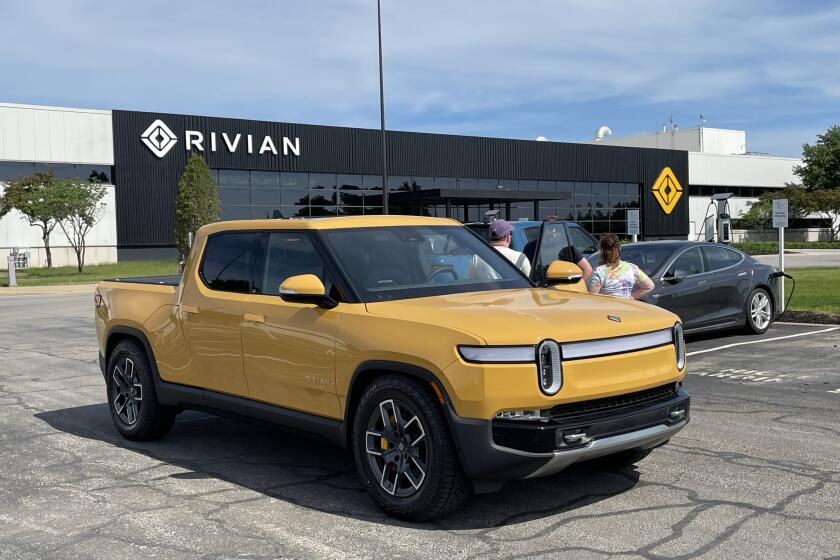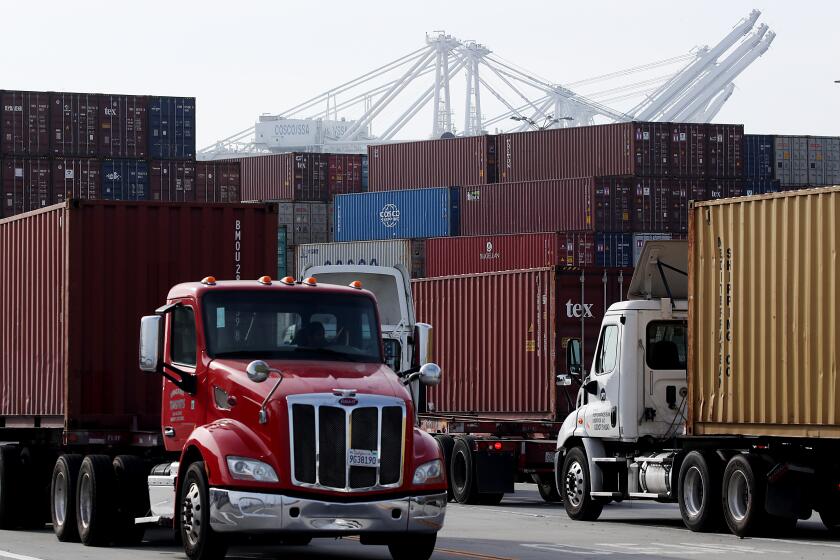Column: The Tesla board’s dilemma: How do you solve a problem like Elon?
Every now and then, decision-makers in government or business have to confront a dilemma with two contradictory qualities: It’s imperative, and impossible.
That’s the dilemma the Tesla board of directors faces with Elon Musk, the company’s chairman and chief executive officer. Musk is inextricably identified with Tesla, its electric vehicle products and its “vision” of a world freed from the tyranny of the internal combustion engine.
If you believe in Elon Musk, then you believe in Tesla. Lots of investors do, which is why the company currently boasts a market capitalization of more than $47 billion despite its inability to generate a profit more than once every few quarters — and then largely via fancy accounting.
Right now this company is the absolute epitome of instability.
— Money manager Mark Tepper
But faith in Musk appears to have been fading, especially among institutional investors. Quite conceivably, their doubts could leach over to the banking and investment banking community. That could be a problem, because contrary to Musk’s assertions, Tesla probably is going to need to raise capital in the next few quarters, and his credibility will be part of the credit-assessment process. The company faces rising interest charges and the imminent maturity of hundreds of millions in outstanding bonds.
In recent weeks, Musk has stepped up his apparent campaign to give grist to his doubters. Given his position as one of the most-watched CEOs on the planet, it’s hardly necessary to list the details. Suffice to say they include his factitious proposal to take Tesla private, supported by what seems to be imaginary capital; whines about the toll that running Tesla is taking on his health; a series of allegedly defamatory tweets about one of the members of the diving team that rescued a group of schoolboys from a flooded cave in Thailand; and a toke on a marijuana blunt taken on camera while participating in a popular podcast.
Tesla stock was up nearly 6% in midday trading Monday, after days of downdrafts. But at $278 and change it’s still about 28% below the peak of $387.46 it hit just after Musk’s going-private announcement on Aug. 7.
This is the behavior of a business leader who has achieved all his goals and has nothing more to prove, and consequently can kick back and tell the world to take a hike.
The problem is that Musk hasn’t yet achieved his goals at Tesla. It’s not a profitable car company, it’s not turning out cars of established reliability, and the market it serves may not be big enough to guarantee its success. Musk still has a lot to prove.
Meanwhile, Tesla is hemorrhaging top executive talent. The day of Musk’s podcast, Tesla announced that Chief Accounting Officer David Morton was leaving the company after less than a month on the job. Morton said in an official statement that “the level of public attention placed on the company, as well as the pace within the company, have exceeded my expectations.”
This sounds weird: A veteran financial executive in the tech industry, how could Morton not have been aware that Tesla is a global leader in terms of the level of public attention it receives, or that — by Musk’s own public admissions — the pace at Tesla is punishing. Morton’s brief tenure spanned the going-private episode, so it’s conceivable that he saw something in the books that scared the hell out of him.
A few Tesla followers have dismissed the marijuana episode as a bagatelle. After all, it’s said, marijuana is legal in California, where the episode took place. Carrying on about someone’s pot-smoking is so ’60s. Maybe Musk was just trying to show his fans that he’s a with-it CEO. Tweeted tech journalist Mike Isaac, “this whole elon thing reminds me how much of a big deal weed still is to people outside of california.”
Yet that’s hardly the point. Musk seems utterly insensitive to the fact that his personal judgment is under the microscope right now, and thumbing his nose at old-school standards of executive behavior at a point when investors and customers are looking for signs of effective management is not a good look.
“Right now this company is the absolute epitome of instability,” money manager Mark Tepper of Strategic Wealth Partners said on CNBC on Monday. “We like buying companies with a good growth story, strong management team, that are reasonably priced and Tesla doesn’t get a check in any of those boxes.”
That brings us to the board. As we’ve written before, a functioning corporate board of directors already would have brought Musk to heel. A responsible board would have ordered Musk to put a sock in it. Such a board would have barred him from Twitter, mandated that all his public statements be vetted by compliance officers and legal counsel. Such a board would have seen to it that 100% of his time be spent solving the manifest problems with Tesla’s production process, which at the moment resembles something Musk is making up as he goes along.
According to Tesla’s most recent proxy statement, issued June 5, its eight directors (not counting Musk himself) were collectively paid $12.3 million in cash and stock options during 2017. Without question, they haven’t earned a dime of that money. They allowed themselves to be blindsided by Musk’s public musing about taking Tesla private, and when he reversed himself after 17 days of self-created turmoil, they slunk away as if nothing had happened. Of the eight, at least four have had other business relationships with Musk and a fifth is his brother, Kimbal.
“We fully support Elon as he continues to lead the company moving forward,” the board’s six “independent” directors said, demonstrating that they remain on a companionable first-name basis with their chairman and CEO.
Plainly, what Tesla needs above all right now is a stable CEO with automotive experience. That’s the imperative. What makes it impossible is that Musk, a 20% owner of the company, is unlikely to let go. He has spoken of the desire to step back, even cede management to another executive, but little in his record suggests that he would give the new man or woman the latitude needed to get the company’s finances and processes in order.
One wonders what executive would accept the job without a clear guarantee that Musk would be kept out of the way. A few weeks ago, Joe Nocera of Bloomberg floated the name of Alan Mulally, who righted the ship at Ford when he relocated there from Boeing in 2006. This is a clever idea, since Ford also had a controlling shareholder in the guise of the Ford family, which owned 40% of the voting power. But the family was motivated to turn over the reins to an outsider, which may not be the case with Musk. In any case, Mulally retired in 2014 and is now 73. (He demurred when Nocera asked him if he’d be interested.)
Whenever I raise questions about Tesla’s future, my email inbox gets inundated with messages from owners of its cars. Their argument is that only those who own or have driven one have adequate knowledge to judge the company. This is exactly wrong. The business graveyard is littered with great ideas and great products that died because their companies died; a stable business approach is what makes even a superb product succeed, not the other way around. Whether Tesla’s cars can even hold their reputation as the premier electric vehicles on the market is open to question, since virtually every other leading automaker is rolling out EVs of its own—and most have a far better record at producing reliable vehicles than Tesla does.
As a company, Tesla is at an inflection point. Musk has promised sterling financial results in the next quarter or two, but his credibility is so low that even if he delivers the numbers he promised, investors may be skeptical that they’re genuine. Indeed, a massive “delivery event” Tesla staged over the weekend at its Fremont, Calif., delivery depot, in which buyers were given their choice of cars on the lot on a “first come, first served” basis has been widely interpreted as almost a desperate attempt to pump up delivery numbers for the third quarter ending Sept. 30.
The Tesla board has its work cut out for it. The directors need to snap a leash on their CEO, find a credible operational executive to run the company, and stop showing that they’re pals with “Elon.” If they don’t, then a few years from now all that will be said about their company is, “Remember Tesla?”
Keep up to date with Michael Hiltzik. Follow @hiltzikm on Twitter, see his Facebook page, or email michael.hiltzik@latimes.com.
Return to Michael Hiltzik’s blog.




